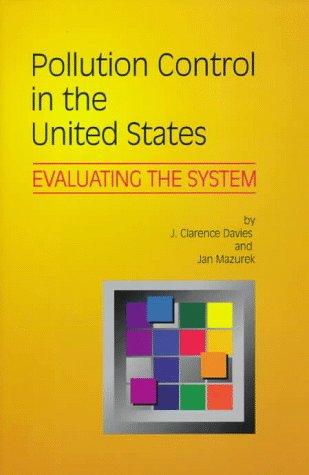Background
Davies, J. Clarence was born on November 16, 1937 in New York City.


( This important new volume emerges from the most extensi...)
This important new volume emerges from the most extensive evaluation of American pollution control ever undertaken. The authors provide authoritative analysis of how our efforts are succeeding and how they are lacking. This is crucial reading for concerned citizens, scholars, and students, and of course policymakers as new environmental, political, and economic realities reshape pollution issues The authors present a clear and detailed description of the pollution control regulatory "system," a complex tangle of conflicted institutions, procedures, and intentions. Examining the character and functioning of the federal Environmental Protection Agency, which is at the center of the system, the authors pinpoint the system's goals and consider which of its priorities are appropriate. While acknowledging the successes of American pollution control in recent decades, the report finds the current system to be seriously flawed and misguided in important ways. Many of the problems can be traced to the structure of the system, a fact that buttresses the case for a more integrated approach Davies and Mazurek tackle the daunting task of evaluating the system, measuring it against meaningful and wide-ranging criteria. They assess the its effectiveness in reducing and controlling pollution, as well as its efficiency in pursuing those tasks. To what degree is the system accomplishing the purposes specified in legislation and regulation? The authors employ monitoring and other data to address that question. And are those the most appropriate goals, or does the system address lesser risks at the expense of more important concerns?The book uses comparative risk analysis to examine that crucial issue. The authors assess the system's efficiency in many dimensions. For example, are its programs cost-effective? How do their benefits compare to the costs? What are the effects on international competitiveness? How does U.S. pollution control fare regarding societal concerns, such as equity and intrusiveness? Those important considerations, often overlooked, receive full attention here, as they are important factors in a program's success and survival. The authors also examine the role and extent of public involvement in the environmental policymaking process. Pollution Control in the United States judges how the American system stacks up against those of other nations, thus providing a useful comparative perspective. In a particularly innovative chapter, the authors consider how well equipped the U.S. system is to meet its likely future challenges. They conclude with some guiding principles for improvement.
http://www.amazon.com/gp/product/091570787X/?tag=2022091-20
Davies, J. Clarence was born on November 16, 1937 in New York City.
Bachelor cum laude, Dartmouth College, 1959. Doctor of Philosophy in American Government, Columbia University, 1965.
Instructor government, director Bureau Research in Municipal Government Bowdoin College, Brunswick, Maine, 1963-1965. Chief examiner environmental and consumer protection Bureau of Budget Executive Office of President, Washington, 1965-1967, senior staff member Council Environmental Quality, 1970-1973. Assistant professor politics public affairs Princeton (New Jersey) University, 1967-1970.
Fellow, assistant director institutions public decisions division Resources for Future, Inc., Washington, 1973-1976. Executive vice president Conservation Foundation, 1976-1989. Assistant administrator policy, planning and evaluation United States Environmental Protection Agency, 1989-1991.
Executive director National Commission on Environment, 1991-1992. Director Center for Risk Management Resources for Future, 1992-2000, senior fellow, since 2000. Senior advisory Woodrow Wilson International Center for Scholars, since 2005.
Consultant United States Bureau of Budget, 1967-1968, United States Department Health, Education and Welfare, 1968-1969, President's Advisory Council on Executive Organization, 1969-1970, National Science Foundation, 1976-1979. Member-at-large executive committee science advisory board Environmental Protection Agency, 1976-1981, chairman administrator's advisory committee toxic substances, 1977-1978, co-chairman committee on economics science advisory board, 1979-1980, member subcommittee environmental statistical National Advisory Council for Environmental Policy and Technology, 1991-1995. Member senior steering committee Center Technology and Administration, American University, 1976-1979.
Member science advisory board International Joint Commission United States-Canada, 1984-1987. Member advisory board Center for Chemical Process Safety, 1985-1989. Member board governors Environmental Health and Safety Institute, National Safety Council, 1986-1989.
Member advisory panel on systems at risk from climate change United States Office Technology Assessment, 1991-1992. Board directors Institute Cooperative Environmental Management, 1991-1993. Chairman board directors Resolve, Inc., 1993-2001.
( This important new volume emerges from the most extensi...)
(Excellent!)
(1976 TPB)
Member board directors Wildlife Habitat Enhancement Council, 1987-1989. Fellow American Association for the Advancement of Science. Member National Academy of Sciences (committee environmental indices 1973-1974, committee on environmental decision making 1975-1977, committee on prevention significant deterioration under Clean Air Act 1979-1981, committee on institutional means for assessment risks to public health 1982-1983, environmental studies board 1983-1985, committee on multimedia pollutants 1986-1988, chairman committee on principals decision making for regulating chemicals in environment 1974-1975, committee social and behavioral science research priorities for environmental decision making 2003-2005, climate change science program committee, 2006-2007), National Institute for Chemical Studies (national advisory board 1986-1989), National Academy of Engineering (steering committee symposium on environmental regulation 1992-1993), National Academy Public Administration (panel on economic incentives 1992-1993, panel on Environmental Protection Agency priorities 1993-1995), Phi Beta Kappa.
